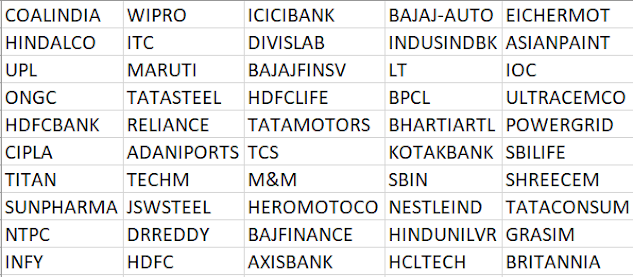How to start your journey in the share market?
The first
thing to do is to learn what is a share? and how does it work?.
Learning
what is a share is the easy part but figuring out how it works is the tough
part where many do not understand that it is a business not betting. You need
to understand that every business has its good days and bad days likewise you
need to figure out how to gain more during good days and how to lose less
during bad days this is the key principle you need to follow to be successful.
The major requirements to start trading in share market are
- Bank account(to transfer money from to share market)
- Kyc documents (to open Demat cum trading account)
- Demat account(to hold your shares)
- Trading account(to buy and sell)
There are mainly 3 types
- Investing
- Day Trading
- Speculating
These 3
styles follow different risk appetites depending on your wrist appetite you can
choose any of the 3 styles and also These 3 styles have different timeframes or
frequencies of trades
Investing
is for low-risk medium gain and the time frame is long like one month to many
years For Example buying equity shares of companies holding it for a prolonged
period
Day Trading
is for medium risk and high gain at the time frame is like one day to few weeks
example intraday trading of equity shares or features buying shares with
leverage
Speculating
is the riskiest of all with the highest gain and the lowest time frame For Example
buying and selling options where you pose the risk of losing your entire
capital within a brief period or you may gain profit more than your first
investment
For
beginners it is best to choose investing which is very less time consuming and
less risky also it provides a good returns and you can Start learning how to
invest and slowly gain knowledge about the share market you can start with a
very low capital So that you won't lose much avoid speculating and following
tips of others till you acquire the basic knowledge on how the market works
after that you can start exploring leverage trading once you gain good
confidence about your trades follow strict principle of having a stop loss to
protect your investment from sudden movements of the market this will protect
your investment from huge losses Always remember that you cannot make profits every
day you need investment protected to trade another day The best principle to
follow here is having a 2:1 ratio for profit versus losses this will give you a
discipline and also make you consistent when following a trading style there
are enormous number of trading styles and strategies you can follow to make
consistent profits by following the rules to one ratio you will make profit
even though if you are successful in 5 out of 10 trades
Coming to
speculation this is more lucrative and looks quite easy for most traders but
it's a deadly trap for many. Speculation is mostly done on nifty and bank nifty
options Where people have equal opportunity to either make 100% profit or lose
100% capital this is the riskiest means of making money in the share market one
large trade can wipe out your entire capital or it can make you rich what is
this purely on probability so it is wise to avoid making huge investments
invest only the amount which you are ready to lose So that it won't make a dent
in your investment strategy
There are
many books you can refer to learn about his trading styles and also there are
many YouTube videos made for beginners My strong advice is that you start by investing
and learn more about the tricks and trends of the market Also I will provide
you with knowledge of value investing in the future blog posts through which
you can become a value investor yourself By following the key concept involved
in understanding a company’s valuation
And learn more about Value investing which is the key strength of the greatest
investors like Warren buffet




Comments
Post a Comment